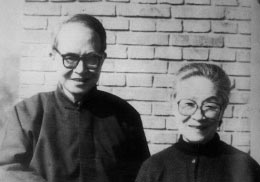
During this period, Qian developed serious asthma and for some time was unable to walk or use a pen to write.
According to Yang, the "Pipe-Awl Collection" was written in abstruse ancient Chinese in order to escape possible political repercussions during the "cultural revolution."
At that time, fanatics could break into the house of renowned scholars like Qian and Yang at any time, and would cart away anything they thought "harmful" to the "political cause."
Also during this period, Yang finished her eight-volume translation of "Don Quixote" by Miguel de Cervantes.
"We never stopped reading and working no matter how difficult the situation was. For our work was our only enjoyment," she writes.
Real or surreal
Yang begins the first two chapters of "The Three of Us" with a recurring dream she used to have in which she was left alone by her husband in a hostile wilderness.
The boundary between reality and illusion is blurred - as Qian was, in fact, hospitalized for almost four years before his death.
In the dream, Qian, weak and emaciated, is hospitalized in a boat, attended by strangers. The house she and Qian lived in is no longer her home but an inn where she temporarily sojourns. Around her the environment is filled with incomprehensible devices and rules.
The only comfort for her is her resourceful and immensely considerate daughter Ah Yuan, who spends most of her young life fulfilling duties required of her by others.
One day, like a candle, Ah Yuan's life is snuffed out.
During the days when she keeps commuting between the boat, the inn, and the suburb hospital where Ah Yuan is kept, Yang has the illusion that she is trudging along a desolate, ancient post road all alone. The road is tiresomely long, but she hopes it will never end.
The dream leaves many readers in tears.


















































